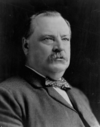Portal:Conservatism
| Main page | Showcase | Project |
Introduction
Conservatism is a cultural, social, and political philosophy and ideology, which seeks to promote and preserve traditional institutions, customs, and values. The central tenets of conservatism may vary in relation to the culture and civilization in which it appears. In Western culture, depending on the particular nation, conservatives seek to promote a range of institutions, such as the nuclear family, organized religion, the military, the nation-state, property rights, rule of law, aristocracy, and monarchy. Conservatives tend to favour institutions and practices that enhance social order and historical continuity.
Edmund Burke, an 18th-century Anglo-Irish statesman who opposed the French Revolution but supported the American Revolution, is credited as one of the forefathers of conservative thought in the 1790s along with Savoyard statesman Joseph de Maistre. The first established use of the term in a political context originated in 1818 with François-René de Chateaubriand during the period of Bourbon Restoration that sought to roll back the policies of the French Revolution and establish social order.
Conservatism has varied considerably as it has adapted itself to existing traditions and national cultures. Thus, conservatives from different parts of the world, each upholding their respective traditions, may disagree on a wide range of issues. Historically associated with right-wing politics, the term has been used to describe a wide range of views. Conservatism may be either libertarian or authoritarian, populist or elitist, progressive or reactionary, moderate or extreme. (Full article...)
Selected article
Selected quote
Reversing Britain’s economic decline was such a huge and painful undertaking that, at least until the later years, the economy had to come first.
In fact, though flawed in some respects, the speech with its emphasis on remoralising society and on strengthening the family, deserves re-reading.
It does not though, reveal much about his essential philosophy, which with Keith — as with most professional politicians — remained below the surface.
The kind of Conservatism which he and I — though coming from very different backgrounds — favoured would be best described as "liberal", in the old-fashioned sense. And I mean the liberalism of Mr Gladstone not of the latter day collectivists.
That is to say, we placed far greater confidence in individuals, families, businesses and neighbourhoods than in the State.
— Margaret Thatcher, Keith Joseph Memorial Lecture ("Liberty and Limited Government"), 11 January 1996
Selected image
The Paris March for Life is an annual demonstration protesting abortion held in the French capital in late January, close to the anniversary date of the 1975 law that legalized abortion in France. Over the years, the Paris March for Life has become the largest annual pro-life gathering in Europe. 2010 saw a sharp rise in attendance, possibly as high as 25,000 compared to 15,000 in 2009.
Credit: Webmasterdelatradition
Did you know...
- ...that Ronald Reagan is the only president of the United States to have his diaries published into a best selling book?
- ...that the California Republican Assembly supported Tom McClintock in the 2003 California gubernatorial recall election?
- ... that Helen Grant became the first black female candidate to be elected as a Conservative member of Parliament?
Selected anniversaries in April
- 1960 – Barry Goldwater publishes The Conscience of a Conservative. The book reignited the American conservative movement and made Goldwater a star.
- 1948 – the period known as La Violencia begins with the assassination of Colombian Liberal Party leader Jorge Eliécer Gaitán. For the next ten years Liberals, Communists and Conservatives would fight each other in the conflict.
- 1980 – the first Washington for Jesus rally is held in Washington, D.C. It will become part of the burgeoning Christian Right movement.
Topics
Associated Wikimedia
The following Wikimedia Foundation sister projects provide more on this subject:
-
Commons
Free media repository -
Wikibooks
Free textbooks and manuals -
Wikidata
Free knowledge base -
Wikinews
Free-content news -
Wikiquote
Collection of quotations -
Wikisource
Free-content library -
Wikiversity
Free learning tools -
Wiktionary
Dictionary and thesaurus










